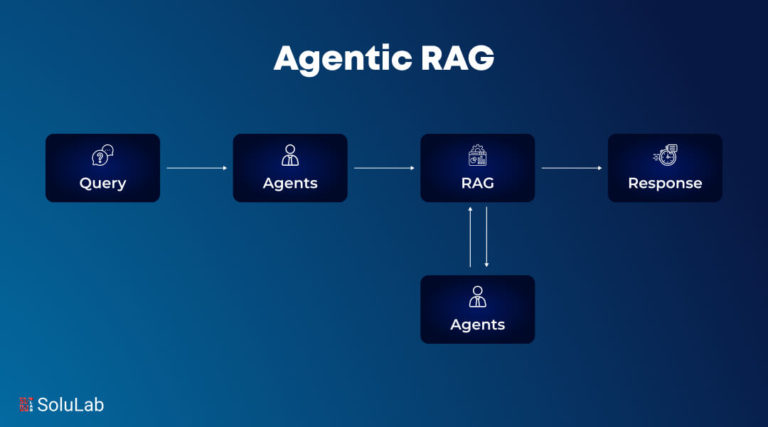
In the fast-paced world of cryptocurrencies, the role of cryptocurrency wallets has never been more significant. These digital repositories serve as the gateway to a decentralized financial future, allowing users to store, manage, and transact with their digital assets securely. As the adoption of cryptocurrencies continues to surge, the demand for robust and user-friendly cryptocurrency wallets has skyrocketed. In this blog, we will delve into the world of cryptocurrency wallets, explore their importance, and discuss the key considerations for cryptocurrency wallet development services.
So, let’s get started!
Understanding Cryptocurrency Wallets
At its core, a cryptocurrency wallet is a software or hardware tool that stores a user’s private keys, which are essential for accessing and managing their digital assets on the blockchain. These wallets come in various forms, each catering to specific needs and preferences. The most common types include software wallets (desktop, mobile, web), hardware wallets (physical devices), and paper wallets (physical printouts of private keys).
The significance of cryptocurrency wallets cannot be overstated. They empower users with control over their funds, allowing them to send, receive, and store cryptocurrencies securely. Moreover, crypto wallet app act as a bridge between individuals and the broader blockchain network, facilitating seamless transactions and interactions within the cryptocurrency ecosystem.
Read Also: 4 Big Problems to Solve in Crypto
The Significance of Cryptocurrency Wallet Development
As the cryptocurrency landscape matures, the importance of custom cryptocurrency wallet development becomes increasingly evident. Off-the-shelf wallet solutions may not always align with the unique requirements of businesses or individuals. Custom crypto wallet development solutions offer several compelling benefits:
- Enhanced Security: Custom wallets can be designed with advanced security features, such as multi-signature authentication, encryption, and biometrics, to safeguard users’ assets from potential threats.
- User Control: Users gain more control over their digital assets when using custom wallets, as they have full ownership of their private keys and, consequently, their funds.
- Branding and Personalization: Custom wallets can be branded and tailored to align with a business’s identity, creating a more immersive and trust-building user experience.
- Compatibility: Developers can ensure compatibility with a wide range of cryptocurrencies, providing users with flexibility in managing their diverse portfolios.
Key Features of Cryptocurrency Wallets
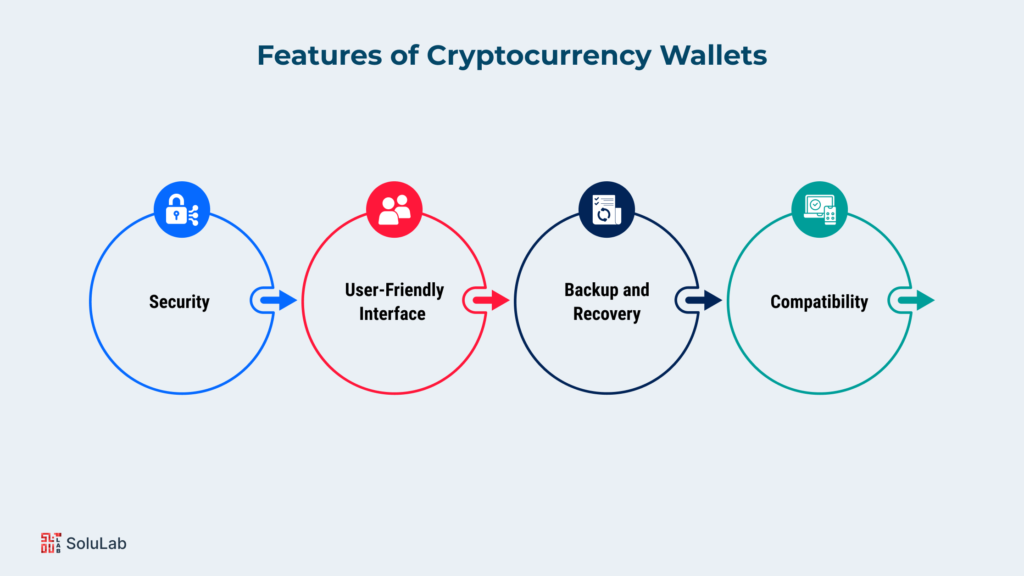
To create a successful cryptocurrency ecosystem, developers must incorporate essential features:
Security
Security is paramount in the world of cryptocurrency, and it’s the most critical feature of any cryptocurrency wallet:
- Private Key Protection: Wallets must employ robust encryption methods to safeguard the user’s private keys, preventing unauthorized access.
- Multi-Signature Support: For approval of a transaction, multi-signature wallets require several private keys, increasing security by ensuring unanimity among numerous participants.
- Biometric Authentication: Integrating biometric authentication methods like fingerprint or facial recognition adds an additional layer of security.
- Hierarchical Deterministic (HD) Wallets: HD wallets generate a new unique public key for each transaction, reducing the risk of address reuse and enhancing anonymity.
- Two-Factor Authentication (2FA): Implementing 2FA adds an extra layer of security by requiring users to enter a one-time code sent to their mobile device or email.
User-Friendly Interface
A user-friendly interface is crucial to attract and retain users. Here’s what it entails:
- Intuitive Design: Wallets should have a clean and intuitive design, making it easy for users to navigate and understand the interface.
- Transaction History: Users should have access to a clear transaction history, showing details of past transactions, including timestamps, recipient addresses, and transaction amounts.
- Balance Overview: Displaying the user’s cryptocurrency balances in a straightforward manner helps users monitor their assets.
- QR Code Scanning: Integrating QR code scanning simplifies the process of sending and receiving cryptocurrencies, especially when using mobile wallets.
- Currency Conversion: Some wallets provide real-time currency conversion, allowing users to see the value of their holdings in different fiat currencies.
Read Blog Post: The Future of User Experience (UX) in Cryptocurrency Wallets: Trends and Innovations
Backup and Recovery
In the event of loss or theft, the ability to recover wallet access is essential:
- Seed Phrases: Wallets often use seed phrases, a series of randomly generated words, as a backup. Users must securely store these phrases as they can be used to recover the wallet.
- Password Recovery: Implementing a password recovery mechanism with proper security measures ensures that users can regain access if they forget their wallet password.
- Hardware Backup: For hardware wallets, having a backup plan or a secondary hardware device is essential for recovery.
Compatibility
To cater to a wide range of users and cryptocurrencies, wallets should be compatible with various assets and platforms:
- Multi-Currency Support: Supporting multiple cryptocurrencies (Bitcoin, Ethereum, Litecoin, etc.) and tokens ensures versatility.
- Cross-Platform Accessibility: Users should be able to access their wallets from different devices (desktop, mobile, web) to maintain flexibility and convenience.
- Interoperability: Some wallets support cross-chain transactions, allowing users to interact with different blockchain networks from a single wallet.
Read Our Blog: Top 10 Decentralized Crypto Exchanges to Consider in 2024
These key features collectively contribute to creating a cryptocurrency wallet that not only ensures the security of users’ digital assets but also provides a user-friendly and versatile experience. Cryptocurrency wallet development services that prioritize these features can help users confidently manage their cryptocurrency portfolios while embracing the opportunities of the decentralized digital economy.
Types of Cryptocurrency Wallets
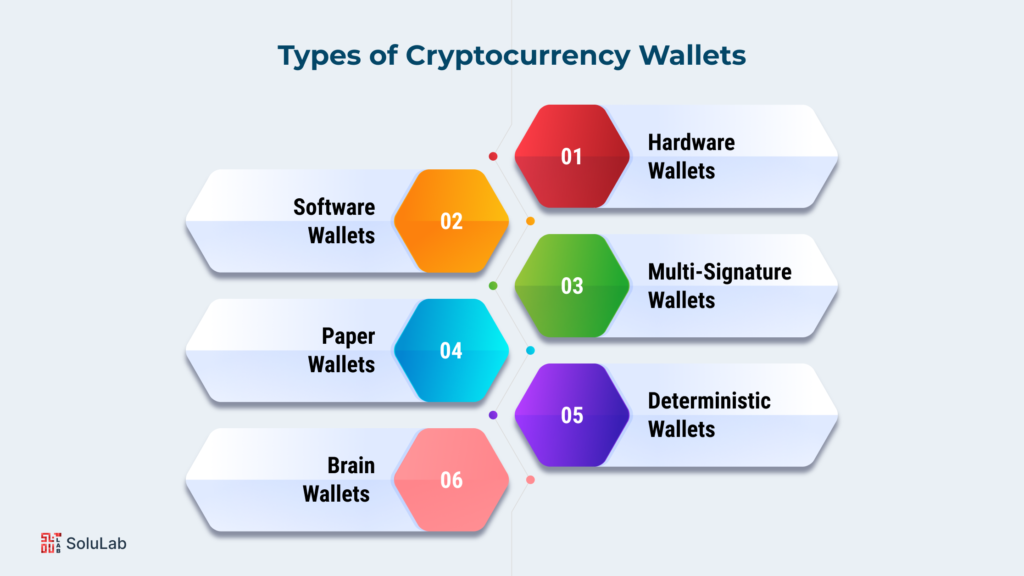
In the rapidly evolving world of cryptocurrencies, the choice of a cryptocurrency wallet plays a pivotal role in ensuring the security and accessibility of your crypto assets. With the surge in crypto adoption, developers and businesses have been actively involved in crypto wallet app development to cater to a diverse range of user preferences and needs. In this section, we’ll explore the various types of cryptocurrency wallets, shedding light on their unique characteristics and functionalities.
Software Wallets
- Desktop Wallets: These wallets are applications installed on a user’s computer. They offer a high level of security and control but are limited to the device where they are installed. Exodus, Electrum, and Atomic Wallet are three prominent desktop wallets.
- Mobile Wallets: Mobile wallet apps are designed for smartphones, providing users with the convenience of managing their crypto assets on the go. They are user-friendly and often feature QR code scanning for easy transactions. Examples include Trust Wallet, Coinbase Wallet, and MyEtherWallet (MEW).
- Web Wallets: Web wallets operate through web browsers and are accessible from any internet-connected device. While convenient, they can be less secure than desktop or hardware wallets due to potential online vulnerabilities. Blockchain.info and Coinbase are prominent web wallet providers.
Hardware Wallets
- Hardware wallets are physical devices designed exclusively for storing cryptocurrency keys offline. They are highly secure, as they are not susceptible to online attacks. Ledger, Trezor, and KeepKey are a few well-known hardware wallets.
Paper Wallets
- Paper wallets are a form of cold storage where a user’s private keys and public addresses are printed or written on a physical piece of paper. This method is immune to online threats but requires careful storage to avoid physical damage or loss.
Multi-Signature Wallets
- Multiple private keys are needed in multi-signature wallets in order to approve transactions. This feature adds an extra layer of security by necessitating consensus among multiple parties, making it a popular choice for business and joint accounts.
Read Our Blog Post: Top 10 Layer 1 Blockchains in 2024
Brain Wallets
- Brain wallets are unique in that they generate private keys based on a passphrase or a memorable phrase chosen by the user. While convenient for memory, they can be vulnerable if the passphrase is not secure enough.
Deterministic Wallets
- Deterministic wallets generate a new public key for each transaction, enhancing privacy and security. Hierarchical Deterministic (HD) wallets, in particular, are popular for their ability to generate an unlimited number of addresses from a single seed phrase.
Cryptocurrency Wallet Development Services: Empowering Secure and User-Friendly Solutions
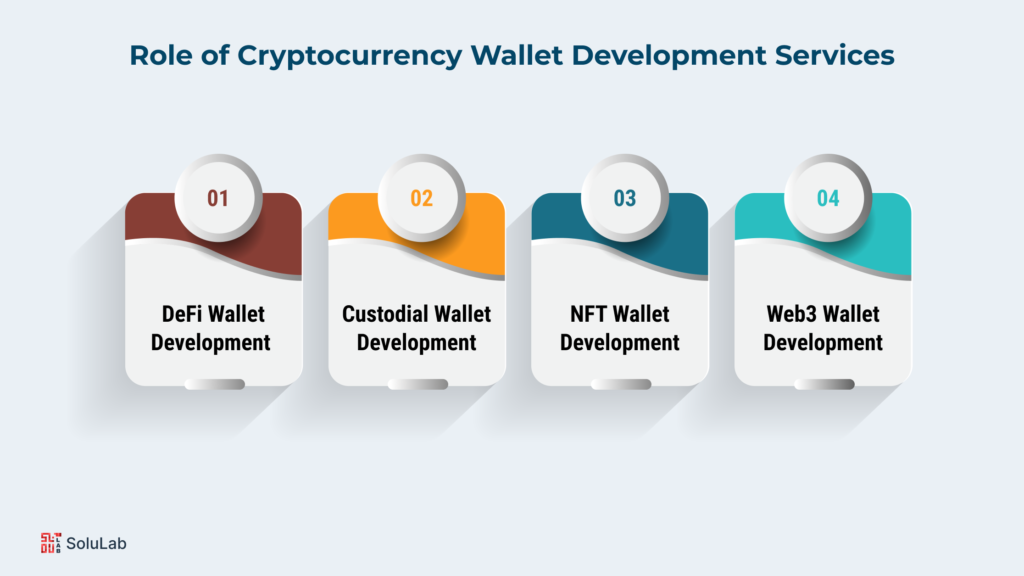
In the rapidly evolving landscape of cryptocurrencies, the role of cryptocurrency wallets cannot be overstated. These digital gateways not only store and manage crypto assets but also facilitate seamless transactions and interactions within the broader blockchain ecosystem protocols. With the increasing adoption of cryptocurrencies, the demand for secure and user-friendly solutions has spurred the growth of cryptocurrency wallet app development services. In this section, we will explore the pivotal role of cryptocurrency development services and how they empower businesses, individuals, and cryptocurrency exchanges and wallets.
-
DeFi Wallet Development
For startups, harnessing professional DeFi wallet development services is a smart move. It grants your users access to a non-custodial wallet with heightened security and private key control, ensuring complete autonomy. Utilizing this development service empowers your customers to revel in the freedom, transparency, security, and accessibility they deserve.
-
Custodial Wallet Development
Embracing custodial wallet development services enhances the security of your cryptocurrency wallet. As an administrator, you wield total control over user funds, holding the private key securely. Even if you lose access to data, your users can regain it through a trusted third party with your permission intact, bolstering their peace of mind.
-
NFT Wallet Development
With NFT wallet development services, you can enable users to store a wide array of trendy NFT collections and facilitate seamless NFT transfers of exceptional quality. This service crafts a visually stunning NFT wallet app that not only draws users in but also keeps them engaged through an intuitive user interface.
Check Blog Post: What are the Benefits of Using Digital Identity with Blockchain in the Future?
-
Web3 Wallet Development
Distinguish yourself from the competition with a highly secure Web3 wallet boasting multi-currency support and powerful asset management features. This Web3 Wallet Development Service introduces an innovative level of security, designed to be transparent and resistant to censorship, thus elevating overall security standards.
Incorporating these methodologies into your crypto wallet app development can set the stage for success. However, the true measure of your app’s success hinges on user experience, robust security features, and a well-thought-out marketing strategy. It is imperative to create a user-friendly and secure app while also executing effective marketing to ensure your cryptocurrency wallet app development thrives.
To transform your crypto wallet app into a thriving venture, consider implementing a wide array of features, providing your users with a comprehensive and rewarding experience.
Reasons to Develop a Cryptocurrency Wallet App for Your Business
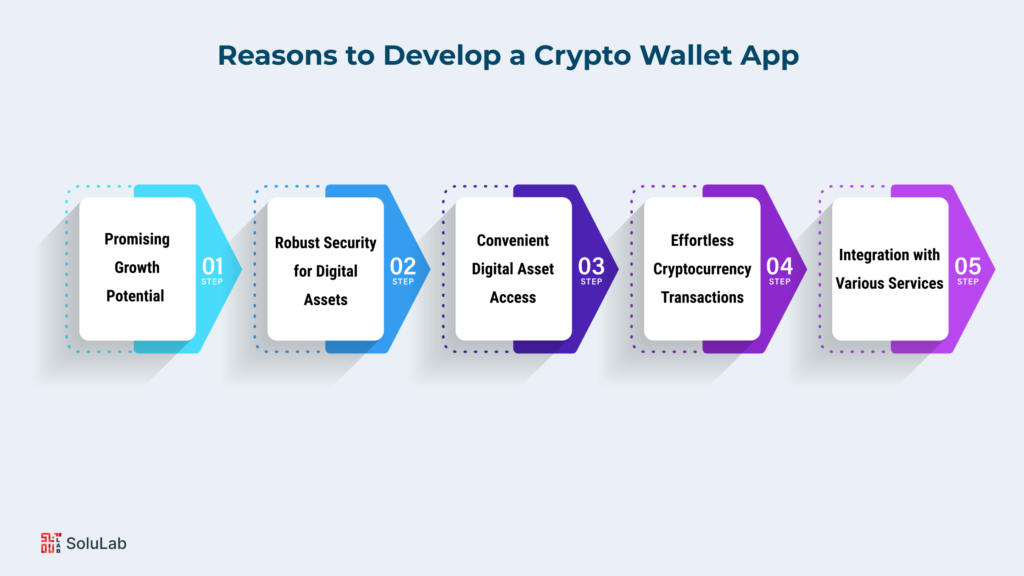
In today’s dynamic digital landscape, the crypto app revolution is reshaping the way we view and manage financial assets. As businesses strive to stay at the forefront of technological innovation, one avenue that holds immense promise is the development of a cryptocurrency wallet app. These digital tools have become more than just a necessity; they are the gateway to a financial world that transcends borders and traditional constraints. In this era of crypto apps, there are compelling reasons why your business should venture into the realm of cryptocurrency wallet app development. So, let’s explore why taking this step can be a game-changer for your business in the ever-evolving crypto ecosystem.
1. Promising Growth Potential: The cryptocurrency market is still in its nascent stages, presenting substantial growth prospects. As more individuals embrace cryptocurrencies, the demand for cryptocurrency wallet apps is poised to expand, especially with potential integration with cryptocurrency exchanges.
Related: The Ultimate Guide for Asset Tokenization on Blockchain
2. Robust Security for Digital Assets: A crypto wallet app offers a robust and secure method for safeguarding digital assets. The app employs encryption to protect users’ private keys, storing them securely on their devices or in the cloud. This mitigates the risk of private key loss, a critical factor given the potential loss of valuable digital assets.
3. Convenient Digital Asset Access: Cryptocurrency wallet apps provide users with easy and convenient access to their digital assets. Whether at home or on the go, these apps offer a user-friendly means to monitor one’s portfolio and transaction history, including the possibility of seamless integration with cryptocurrency exchanges.
4. Effortless Cryptocurrency Transactions: With a cryptocurrency wallet app, users can effortlessly send and receive cryptocurrencies. Sending digital assets to other users or businesses is a simple process that only requires a few taps on their devices, streamlining transactions and potentially facilitating integration with cryptocurrency exchanges and wallets.
5. Integration with Various Services: Some cryptocurrency wallet apps seamlessly integrate with a range of services, including cryptocurrency exchanges and payment gateways. This integration enhances the overall user experience, allowing for smoother interactions with cryptocurrency exchange development services and other related services.
The potential for future growth in the cryptocurrency market, coupled with the secure storage of digital assets, ease of access, and efficient transaction capabilities, make developing a cryptocurrency wallet app a viable and promising business venture, especially when considering potential integration with cryptocurrency exchanges.
Future Trends in Cryptocurrency Wallets
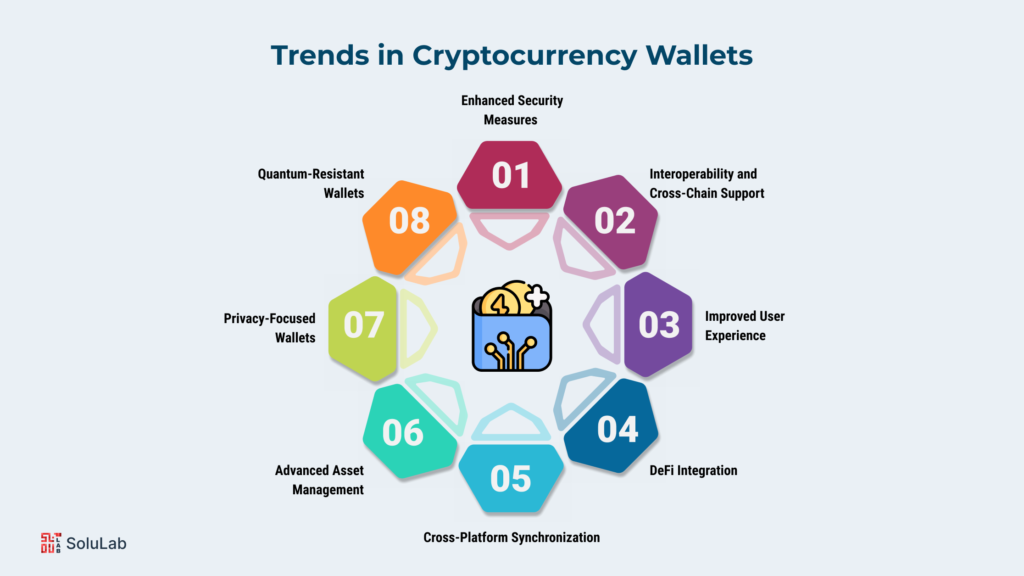
The world of cryptocurrency wallets is continuously evolving, and as the crypto ecosystem matures, several exciting trends are emerging on the horizon. These trends promise to reshape the landscape of cryptocurrency wallet development and user experience. Here’s a glimpse into what the future holds for cryptocurrency wallets:
1. Enhanced Security Measures: As cryptocurrencies gain wider acceptance, wallet security will remain a paramount concern. Future wallet developments will likely include even more advanced security features, such as biometrics, hardware security modules (HSMs), and decentralized identity solutions, to fortify protection against evolving threats.
2. Interoperability and Cross-Chain Support: With the proliferation of blockchain networks and assets, the demand for wallets capable of supporting multiple cryptocurrencies and facilitating cross-chain transactions will surge. Future wallets are likely to focus on enhancing interoperability, making it easier for users to manage diverse crypto portfolios.
3. Improved User Experience: Cryptocurrency wallet developers are increasingly investing in creating intuitive, user-friendly interfaces. Future wallets will continue to prioritize ease of use, making cryptocurrency transactions as straightforward as using traditional financial apps.
4. DeFi Integration: The decentralized finance (DeFi) space is booming, and wallets are positioning themselves to be the gateway to DeFi services. We can expect future wallet integrations with DeFi platforms, allowing users to seamlessly access lending, borrowing, yield farming, and decentralized exchanges within their wallets.
5. Cross-Platform Synchronization: Users are demanding seamless access to their crypto holdings across various devices. Future wallets will likely emphasize cross-platform synchronization, enabling users to manage their assets effortlessly from desktops, mobile devices, and web browsers.
6. Advanced Asset Management: Wallets of the future will offer more sophisticated asset management features, including portfolio tracking, asset analytics, and automated investment strategies, providing users with a comprehensive view of their crypto holdings.
7. Privacy-Focused Wallets: As privacy concerns grow, we can expect an increase in the development of privacy-focused wallets that offer enhanced anonymity and data protection features.
8. Quantum-Resistant Wallets: With the advent of quantum computing, the need for quantum-resistant cryptography in wallets will become more critical. Future wallets will likely incorporate quantum-resistant encryption methods to protect against quantum attacks.
Read Our Recent Press Release: SoluLab Bridging the Gap Between Technology And Innovation
In the rapidly evolving world of cryptocurrencies, staying ahead of the curve is essential.
Businesses and individuals should keep an eye on these future trends in cryptocurrency wallets to harness the full potential of this dynamic and transformative technology. Whether you’re a developer, investor, or enthusiast, these trends will undoubtedly shape the future of how we manage and interact with digital assets.
Final Words
In the world of cryptocurrencies, where security, accessibility, and user experience are paramount, the role of cryptocurrency wallets stands as a crucial cornerstone. As we’ve explored in this blog, the rise of cryptocurrency wallets brings with it a multitude of considerations for development services. These considerations encompass the need for robust security features, intuitive user interfaces, compatibility with various cryptocurrencies, and seamless integration with emerging technologies like DeFi and NFTs.
As the crypto landscape continues to evolve, businesses and individuals alike must recognize the immense potential and opportunities presented by cryptocurrency wallet development services. By embracing these key considerations and staying attuned to the ever-changing trends in the field, we can harness the power of cryptocurrency wallets to not only securely store digital assets but also to navigate the exciting and transformative terrain of the crypto ecosystem. In doing so, we position ourselves to thrive in the digital financial frontier of tomorrow, where cryptocurrency wallets are not just tools but gateways to a decentralized and borderless future.
In the dynamic world of cryptocurrency wallets, SoluLab, a crypto wallet development company, emerges as a trusted partner to navigate the complexities and seize the opportunities that lie ahead. With a commitment to cutting-edge development, SoluLab offers expert guidance, security-driven solutions, and seamless integration services that align with the evolving needs of businesses and individuals. By choosing SoluLab, you empower yourself to leverage the full potential of cryptocurrency wallet development, ensuring not just secure asset storage but also a seamless entry into the decentralized, borderless financial future. Embrace innovation, security, and user-centric design with SoluLab and stay ahead in the ever-evolving landscape of cryptocurrency wallets. Your journey toward a transformative digital experience begins here. Contact SoluLab today.
FAQs
1. Why should I consider custom cryptocurrency wallet development over using existing wallet solutions?
Custom cryptocurrency wallet development allows you to tailor the wallet to your specific needs, ensuring enhanced security, brand identity, and features that align with your business or personal requirements. While existing wallet solutions offer convenience, custom wallets provide a competitive edge.
2. Are cryptocurrency wallets only for storing Bitcoin, or can they hold other cryptocurrencies as well?
Cryptocurrency wallets are versatile and can store a wide range of cryptocurrencies, not just Bitcoin. Many wallets support multiple digital assets, including Ethereum, Litecoin, Ripple, and various tokens. The choice of wallet often depends on the specific assets you intend to manage.
3. How do I ensure the security of my cryptocurrency wallet and digital assets?
Security is paramount in cryptocurrency wallet usage. To enhance security, choose wallets with features like encryption, multi-signature authentication, and regular updates. Safeguard your private keys and use secure, reputable wallet providers. Additionally, stay informed about potential threats and best security practices.
4. What is the role of cryptocurrency wallet integration with exchanges, and why is it essential?
Integration between cryptocurrency wallets and exchanges allows users to seamlessly trade and manage their assets. It streamlines the user experience, offering real-time access to exchange balances and transactions. This integration is crucial for traders, investors, and anyone actively engaging with cryptocurrencies.
5. What trends can we expect in the future of cryptocurrency wallets, and how can businesses prepare for them?
The future of cryptocurrency wallets is likely to see trends like enhanced security measures, DeFi integration, cross-chain support, and improved user experience. To prepare for these trends, businesses should consider staying updated on emerging technologies, investing in user-friendly interfaces, and emphasizing security in their wallet offerings. It’s crucial to adapt to the evolving crypto landscape to remain competitive.






